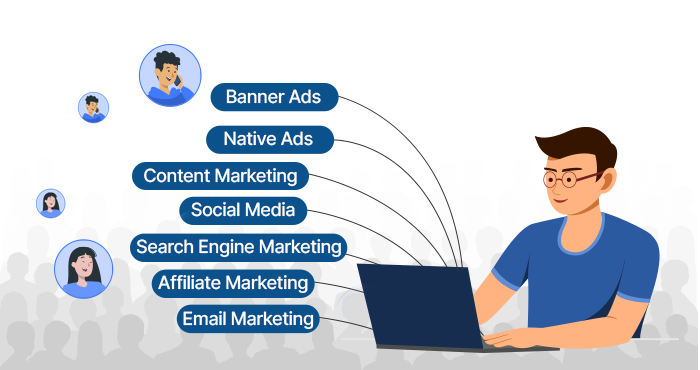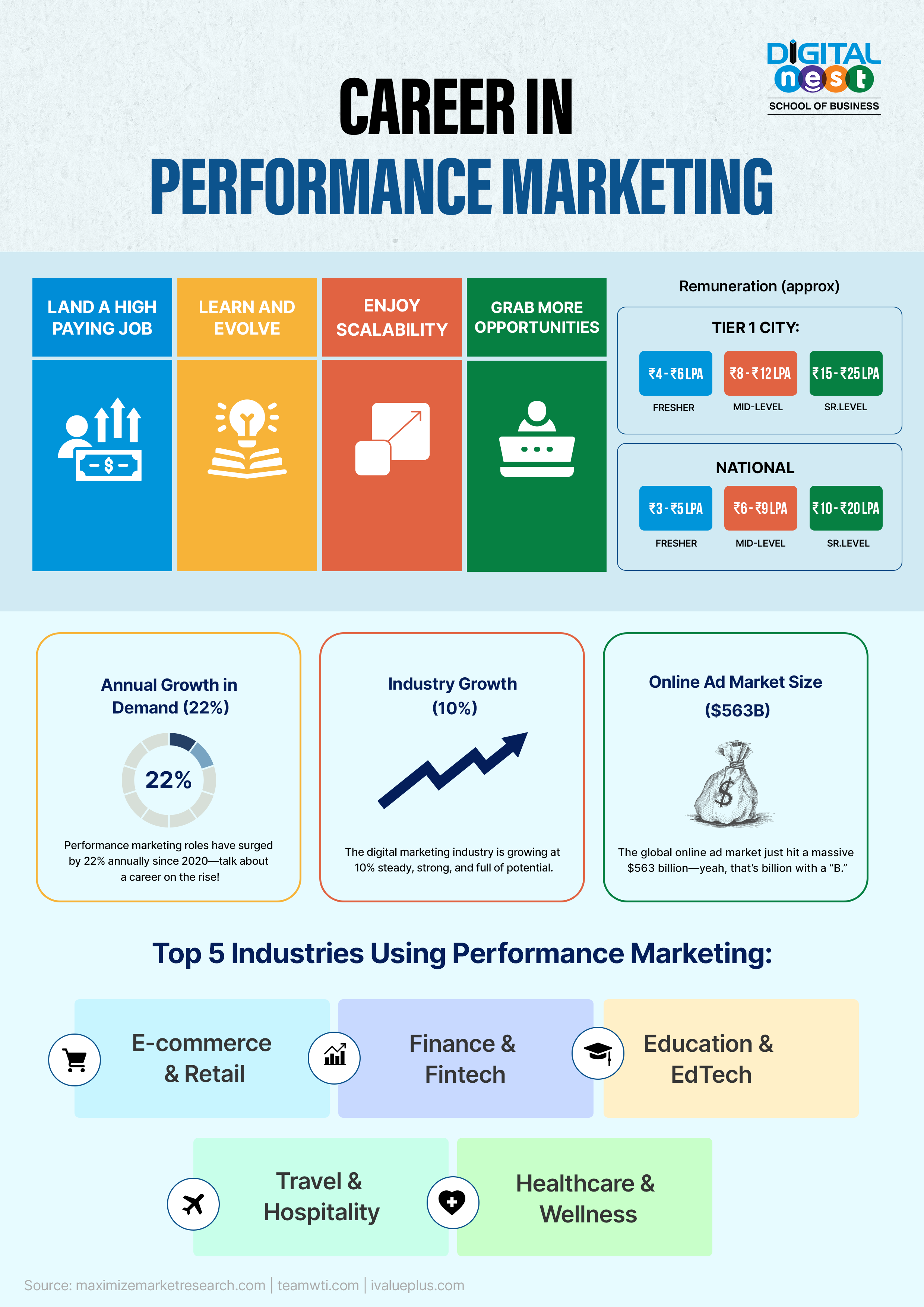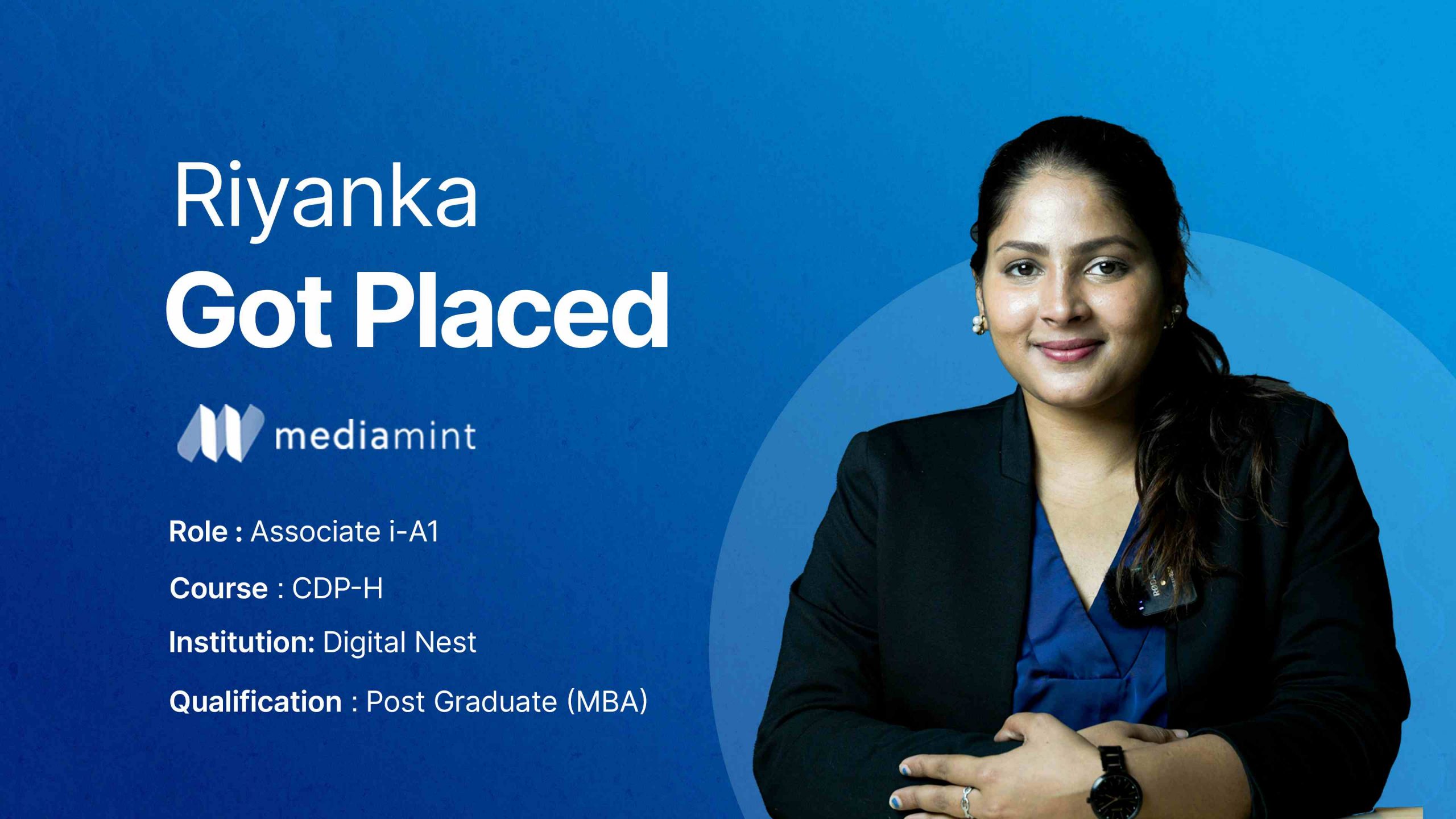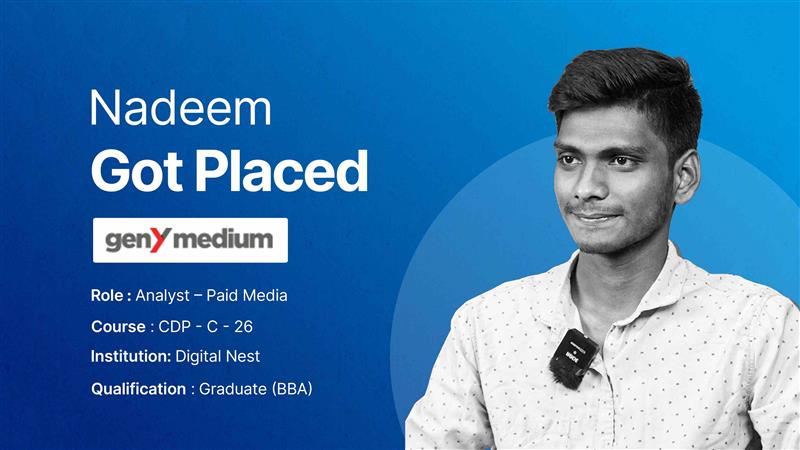- What is Performance Marketing?
- How Does Performance Marketing Work and How Do Advertisers Utilize It?
- Why is Performance Marketing Crucial for Career Growth?
- Essential Skills for Performance Marketing
- How to Develop Performance Marketing Skills?
- What are the Performance Marketing Channels?
- Why Do Marketers Prefer Performance Marketing for Business Growth?
- What is Performance-Based Advertising?
- How Does Performance-Based Advertising Work?
- Success Stories
- Conclusion
- Frequently Asked Questions on Performance Marketing (FAQs)
What is Performance Marketing?

Imagine this: One campaign, a few clicks, and ₹₹₹ pour into your business!
Welcome to the world of performance marketing.
Digital marketing helps a business establish its online presence and engage with its audience. Though it is a long-term strategy to increase revenue, advertisers vouch for ‘Performance Marketing,’ a digital marketing strategy where you only pay when specific actions—such as clicks, leads, or conversions—are achieved. This has undoubtedly revolutionized the marketing industry, and thus, a career in performance marketing is more lucrative if you master the technique.
This blog lists the impact that performance marketing has created in the industry and how to secure your career with the right skills in this field.
The best way to describe performance marketing is as ‘creative content in the form of images, videos, and GIFs run through media with a clear goal.’ The goals are to drive performance, get clicks, and ultimately achieve conversions. These metrics are measurable and showcase your achievements in detail. That’s how the name “performance marketing” was derived—you pay for the performance of the campaign, which is measured by every click, conversion, or sale that happens.
Trends keep changing, and new types of content emerge from these trends. However, great performance marketing campaigns are not achieved by a single piece of creative content. Performance marketing is a combination of tactics that span from entertainment and awareness to consideration and conversion. If you execute everything correctly, you can watch the magic of performance marketing unfold and see your business find the path to great success.
How Does Performance Marketing Work and How Do Advertisers Utilize It?
Performance marketing is based on a few predefined KPIs (Key Performance Indicators) such as sales, leads, or app downloads. Marketers use tools and analytics to track and monitor campaign performance in real-time, optimizing strategies to achieve their goals.
Performance marketing helps marketers target specific audiences, track their behavior, and improve advertisement efficiency. It is common for performance marketers to work with influencers and ad networks to drive the desired outcome. These campaigns often include PPC (Pay-Per-Click), affiliate marketing, and retargeting strategies to maximize engagement.
For example, if an e-commerce platform plans to launch a new product line, it needs to set KPIs such as total sales and app downloads. Their marketing team will run PPC ads on search engines and social media. The next step is collaborating with influencers to promote the products and employing retargeting strategies to re-engage users who visited the site but didn’t make a purchase. With continuous monitoring and optimization of these campaigns, the marketers will achieve the highest possible return on investment (ROI).
Why is Performance Marketing Crucial for Career Growth?

Businesses are now focusing more on ROI-driven marketing, and professionals skilled in performance marketing are in high demand. With a certification in performance marketing, you can:
- Land a high-paying job in digital marketing agencies and corporate firms.
- Grab more opportunities for remote work and freelancing.
- Enjoy scalability as you can use this skill across industries.
- Learn and evolve with technology and come up with new strategies for business problems.
Essential Skills for Performance Marketing
If you want to succeed as a performance marketer, you must develop the following skills:
- Develop analytical skills to interpret data and optimize your campaigns.
- Learn SEO (Search Engine Optimization) & SEM (Search Engine Marketing) for running search-driven marketing.
- To run Google and social media ads efficiently, you need to perfect PPC (Pay-Per-Click) management.
- Improve campaign performance with Conversion Rate Optimization (CRO).
- Explore partnership strategies with affiliate and influencer marketing knowledge.
How to Develop Performance Marketing Skills?
Enroll in an online course: Platforms like SkillMob offer certified programs that will help you upskill and land a job with ease.
Gain hands-on experience: You can either apply for an internship or join the Digital Nest School of Business, where you will be trained by experts, coached by industry experts, and finally exposed to real-world business problems.
Learn from the experts: Follow blogs and podcasts by industry leaders.
Master performance marketing tools: You need to familiarize yourself with SEMrush, HubSpot, and Google Analytics.
Always stay updated: Digital marketing is evolving, and you need to keep learning to grow in this field.
What are the Performance Marketing Channels?
There are around seven types of performance marketing channels you can choose from:
Search Engine Marketing
A majority of people do research on products and services through search engines (Google, Bing, or Yahoo), and to be found by them, you need a website optimized for search engine marketing. Another way of being found by the users is through paid advertising. Here, the cost of running the ads depends on the total clicks you get through paid advertising.
Social Media
It is one of the favorite channels of the marketers. One can precisely locate and target their audience through social media such as Facebook, Instagram, LinkedIn, X, etc. The marketer can not just drive the traffic to their site; if the ad is really good, they can expect more shares from the users and more traffic in the following days. It is the most effective channel to reach new customers.
Email Marketing
Email marketing is still alive and bringing more revenue than many other popular channels. It involves sending personalized emails to users based on their behavior and preferences, such as new offers/products, abandoned carts, and other updates. Each mail is tailored to cause behavioral triggers and persuade the user to click on the call-to-action button. With A/B testing and continuous improvement through analytics, this approach enhances engagement and increases conversions throughout the campaign.
Content Marketing
There is no better way of improving a brand’s image than educating and helping your audience make an informed decision. Brands can provide informational content to their audience through blogs, e-books, case studies, etc., and add a link back to your products and services.
Banner Ads
Though ad blockers have reduced the reach of banner (display) ads, brands still generate quality leads through these ads. You will find these ads on Facebook Newsfeed, new websites, YouTube, mobile apps, and other online platforms.
Affiliate Marketing
This is a marketing channel where brands reward affiliates (partners) for driving traffic to the former’s website or e-commerce platform. An affiliate promotes the products or services using unique tracking links and earns a commission for each successful conversion (sale or lead). This channel lets businesses expand their reach to new customers while only paying for actual results.
Native Advertising
As the name suggests, these ads appear as one among the products and services as pictures or videos on the webpage you are surfing. You’ll often spot native ads in suggested playlists on music apps or ‘Watch Next’ recommendations on streaming platforms. Users won’t find any difference between these types of ads, and these methods of advertising are more natural and effective.
Why Do Marketers Prefer Performance Marketing for Business Growth?
Marketers know the value of time, money, and brand image, and performance marketing is the most cost-effective way of getting measurable results with the available budget. It offers high accountability and precise targeting and ensures each penny is used efficiently. In addition, performance marketing is data-driven, enabling continuous optimization and scalability options. This helps businesses achieve specific growth and maximize their return on investment.
What is Performance-Based Advertising?
While usual advertising options cost you money for impressions and ad display duration, the performance-based advertising model charges for specific actions such as clicks, conversions, or sales. This model ensures that advertising spending is directly tied to measurable business results. This includes models like,
- Cost-Per-Click (CPC)
- Cost-Per-Action (CPA)
- Cost-Per-Lead (CPL)
With these models, both parties can be transparent to each other and be cost-effective all the time.
How Does Performance-Based Advertising Work?
The advertisers can set the duration, goals, and estimated budget for the campaigns. It could be for increasing website traffic, lead generation, or making sales.
Here are the steps for setting up the campaigns:
- Define a specific performance goal for the ad campaign.
- Identify your target audience, including their demographics and interests.
- Choose the right advertising channel to reach them.
- Use text, images, and videos for your ad content.
- Set the overall budget and bid for each action.
- Finalize the channel for the campaign and launch it.
- Track the performance and analyze the results.
- Observe the performance data and optimize the campaign.
Success Stories

Riyanka Nanda has always been interested in the marketing and management part of her job. After working at ICICI Securities and VVT Solutions, she discovered digital marketing, and the first thing she did was move to Hyderabad and join Digital Nest. As an MBA graduate from Biju Pattnaik Institute of Information & Technology, she was well-versed in management skills, and with the Certified Digital Marketing Program from Digital Nest, she landed her dream job at MediaMint. She is now working as Associate i-A1 at MediaMint and has plans to learn, connect, and upskill in her career through Digital Nest’s robust alumni network and workshops.

Nadeem completed his graduation (BBA) from Chandigarh University. His career goals were already set—to become a professional in digital marketing. After joining Digital Nest, his soft skills and technical skills were enhanced. At present, he has joined Gen Y Medium as an analyst-paid media and is thriving in the corporate world.
Conclusion
Performance marketing is changing the advertising world as well as the lives of the professionals who choose to master this skill. Master this skill to secure a high-paying role and drive multiple marketing results. Whether you are a beginner or an experienced marketer, invest in a performance marketing course and accelerate your career.
Frequently Asked Questions on Performance Marketing (FAQs)
What are the types of Performance Marketing?
The main types of performance marketing are Search Engine Marketing (SEM), social media advertising, affiliate marketing, native ads, and email marketing.
What are the Performance Marketing Tools?
Performance marketing tools include Google Analytics, SEMrush, HubSpot, Ahrefs, and Facebook Ads Manager.
What's Performance Marketing in Digital Marketing?
It is a result-driven approach where advertisers pay for specific user actions.
What is the difference between performance marketing and digital marketing?
Digital marketing covers all online strategies, while performance marketing focuses solely on measurable outcomes.
What is the difference between performance marketing and growth marketing?
Performance marketing only focuses on immediate, measurable results. Whereas growth marketing takes a holistic approach, incorporating long-term brand-building strategies, customer retention, and engagement.
Who uses performance marketing?
E-commerce brands, SaaS companies, digital agencies, and influencers.
Nivin Chandran is a seasoned Sr. Copywriter at Digital Nest School of Business with over 5 years of experience in writing about education, technology, business, science, and more. He has authored over 500 blogs across various industries, including IT, FMCG, F&B, Real Estate, and IoT. Nivin’s expertise and versatile writing skills make him a valuable asset in the content creation field.


